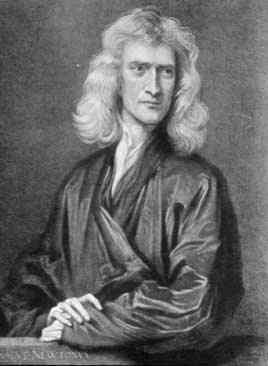 laws
of motion:
laws
of motion:
|
Newton had proposed the idea of there being a set of laws which governed all that happened in the universe, building on the efforts of Descartes and others to artculate laws of mechanics. (We are talking here of the birth of modern physics.)
In the Principia (Philosophiae Naturalis Principia Mathematica, 'The
Mathematical Principles of Natural Philosophy', 1687 - excerpt,
since you ask) Newton had set forth his 'System of the World'. The world system
consisted of material bodies (consisting of groups of small hard particles)
at rest or in motion and interacting ccording to three  laws
of motion:
laws
of motion:
1. Every body continues in its state of rest or of uniform motion in a straight line unless it is compelled to change that state by forces impressed upon it.
2. The change of motion is proportional to the motive force impressed and is made in the direction of the straight line in which that force is impressed.
3. To every action there is always opposed an equal reaction; or, the mutual action of two bodies upon each other is always equal and directed to contrary parts.
To these principles he added the general law of gravitation, which in a modern formulation asserts:
Every particle of matter attracts every other particle with a force varyng directly as the product of their masses and inversely as the square of the distance between them.